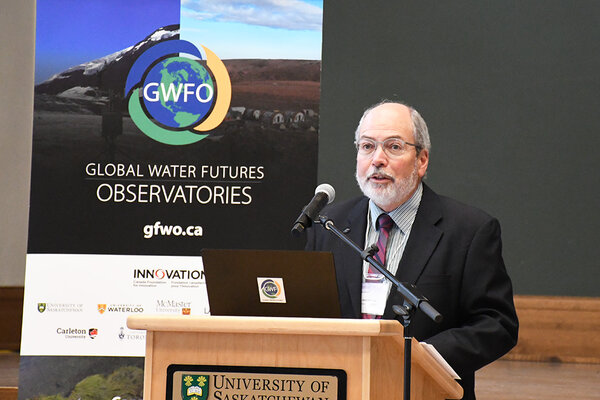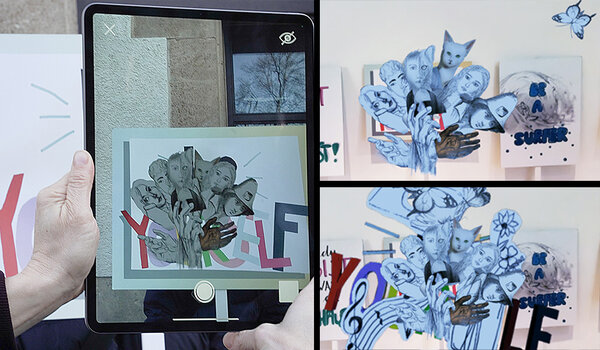
High-achieving U of S student to focus on Alzheimer’s and artificial intelligence
Francois Roewer-Despres will receive three awards from the College of Arts and Science on June 4
By Shannon Boklaschuk
Francois Roewer-Despres has always found research with applications that benefit society to be the most compelling.
The high-achieving University of Saskatchewan undergraduate student will receive his Bachelor of Science degree (double honours in computer science and economics) at U of S Spring Convocation on June 5. He then plans to focus on both the diagnostic and quality-of-life applications of artificial intelligence to health care—specifically Alzheimer’s disease—when he begins graduate studies at the University of Toronto in the fall.
“The research group I will be joining at the University of Toronto has already successfully used machine learning as a diagnostic tool for Alzheimer’s by detecting early signs of the disease in the way a patient talks—and it does so long before an official diagnosis is made,” Roewer-Despres said.
“For my part, I’ll be working on improvements to an in-home robotic assistant prototype that helps patients with memory recall tasks and other quality-of-life improvements in the home.”
Given society’s longer lifespans and aging populations, the rate of Alzheimer’s and other age-related diseases is increasing in Canada and around the world, said Roewer-Despres. As a result, there is a need to find novel solutions to the life-altering conditions, he said.
“Within artificial intelligence, machine learning—especially neural networks and deep learning—has made exceptional breakthroughs as a modelling tool by providing a simple, yet powerful, framework with which to model phenomena too complex for more traditional tools,” he said.
“Machine learning is rapidly becoming one of the most promising ways to tackle many of the important problems we face today and in the future, including many problems in health care. Notwithstanding the astounding achievements of machine learning, many technical challenges still lie ahead. I find this incredibly stimulating, and I am excited to be joining the University of Toronto—one of the most prominent artificial intelligence research hubs in North America—to tackle these challenging problems with likeminded researchers.”
Before receiving his undergraduate degree from the U of S and getting to work on his grad studies, Roewer-Despres will be honoured by the College of Arts and Science during the annual Convocation Dinner and Awards Ceremony on June 4. He will receive three awards at the event: the Earl of Bessborough Prize in Science, the Haslam Medal and the Most Outstanding Graduate in Computer Science.
“I was very excited when I heard the news. I’ve worked hard on maintaining my grades for so many years, and it’s very rewarding to see that effort culminating in this recognition,” he said.
“Academically, the most important thing I’ve learned is that modelling is the key to all great science, whether it’s modelling population growth in biology, modelling human behaviour in psychology, modelling real-world distributions in statistics, modelling marketplace interactions in economics or modelling the brain in artificial intelligence—a subfield of computer science.
“Personally, the most important things I’ve learned are time management and group project skills.”
Roewer-Despres has achieved academic success during his undergraduate studies, receiving multiple university scholarships throughout the years and the Natural Sciences and Engineering Research Council of Canada (NSERC) Undergraduate Student Research Award three times—the lifetime maximum. He is also the recipient of an NSERC Canada Graduate Scholarship for his Master of Science program.
Outside of academics, Roewer-Despres volunteers as a youth study group peer mentor with the Saskatoon Open Door Society, helping to facilitate high school integration for new immigrants and refugees by guiding students through homework and life-skills tasks. During the last few months, he’s learned the basics of music theory and screenwriting and now enjoys composing music and writing screenplays in his spare time. He also enjoys “learning anything and everything to do with computer science,” whether it’s a new programming language, a new software or library tool or a new concept.
Roewer-Despres said the best part of his undergraduate studies at the U of S was interacting with his peers, and he met “many likeminded people and made some pretty great friends that way.”
He offers this advice for other undergraduate students: “You know you’ve picked the right major when studying it feels more often like fun than like work.”
“Also, keep in mind that success is not about being gifted, talented or brilliant, but rather about effort, perseverance and hard work. That doesn’t mean you have to do nothing but work, though. Remember to also relax once in a while, and to take care of both your mind and your body,” he said.
“Finally, if you’re unsure whether to pursue graduate studies or to enter the job market as soon as you graduate, try having a summer research job one year and a summer internship the next to acquire some firsthand experience before making your final decision.”

